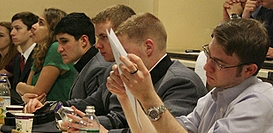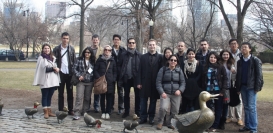Professional Workshop

An EPIIC “Pugwash” Professional Workshop
A Response to
The Report on Privacy and Progress in Whole Genome Sequencing
by the Presidential Commission for the Study of Bioethical Issues
February 21, 2013
8:30 AM Arrival, Light Breakfast and Coffee
9:00 AM Welcome and Introductions
Workshop Introduction: David Harris
Provost and Senior Vice President, Tufts University
Co-Conveners Jonathan Moreno and Juan Enriquez
Institute for Global Leadership Founding Director Sherman Teichman
9:15 AM Summary of the Presidential Commission Report
Kayte Spector-Bagdady, Associate Director, Presidential Commission for the
Study of Bioethical Issues
10:00 AM Overview: Program, Promise and Ethical Concerns
Co-Conveners Dr. Jonathan Moreno and Mr. Juan Enriquez
10:30 AM The Progress and Promise of Whole-Genome Sequencing
Jason Bobe, Executive Director, PersonalGenomes.org
Juan Enriquez, Managing Director, Excel Venture Management
Robert Green, Brigham and Women’s Hospital Research Institute Division of Genetics
Jamie Heywood, Founder ALS Therapy Development Institute
Christian Macedonia, Program Manager, Defense Sciences Office, US Department of Defense
Nancy Wexler, Higgins Professor of Neuropsychology, Columbia University School of Medicine
12:00 PM Lunch
1:00 PM Ethical Genomics: Ensuring Privacy and Preventing Abuse
George Annas, Professor of Medicine and Law, Boston University
Melissa A. Gymrek, PhD candidate, Whitehead Institute, MIT
Debra Matthews, Assistant Director, Science Programs, Berman Institute of Bioethics, Johns Hopkins University
Jonathan Moreno, Professor of Medical Ethics and the History and Sociology of Science, University of Pennsylvania
Michael Rugnetta, former Research Assistant, Progressive Bioethics Initiative, Center for American Progress
2:30 PM Panelist Discussion and Deliberation
Where should the balance be placed between individual privacy and the potential for medical breakthroughs? What are some of the dangers of exploitation of genomic data for discrimination? Are the surrounding fears justified? How will private citizens and entities deal with discrimination and stigmatization based on genomic information?
What are the consequences of failing to ensure genetic privacy? Conversely, what are the problems which could arise should the sharing of genetic data be restricted? How can consent for related individuals be protected should one decide to sequence, thus partially exposing the others’ genomes?
What compensation, if any, should individuals receive for their genes? Should one be allowed to profit, and to what extent, from the development of medicines based off of someone else’s life code? How will these advances affect the cost of medicine in a nation that already spends a large portion of its budget on healthcare?
3:30 PM Recommendations for the Presidential Commission for the
Study of Bioethical Issues
4:30 PM Adjourn
An EPIIC Professional Workshop
A Response to
The Report on Privacy and Progress in Whole Genome Sequencing
by the Presidential Commission for the Study of Bioethical Issues
Participant Biographies
George Annas, considered “the father of patient rights,” is a Professor of Medicine and Law at Boston University and the founder of the international NGO, Lawyers for Human Rights. A Joseph P. Kennedy Fellow in Medical Ethics, his books include: Worst Case Bioethics, The Rights of Patients, Judging Medicine, Some Choice: Law, Medicine and the Market, and American Bioethics: Crossing Human Rights and Health Law Boundaries.
Jason Bobe is Executive Director of PersonalGenomes.org and Director of the Community for the Personal Genome Project, a collaborative effort with Professor George Church at Harvard Medical School which seeks to improve the accessibility and utility of whole-genome sequencing. Bobe is also a founder of DIYbio.org, a community which fosters amateur biology and provides classes in methods, safety, and ethical practice. He has worked as a Business Development Consultant for OpenWetWare.org, as the Director of Business Development at DNA Direct, and as an independent consultant.
Juan Enriquez is a Managing Director at Excel Venture Management, a venture capital firm that invests in companies that apply transformative life science technologies to solve problems in healthcare and beyond. He was the Founding Director of Harvard Business School’s Life Sciences Project and among his books are As the Future Catches You, on the impact of the bio-based economy, and Homo Evolutis (co-authored with Dr. Steve Gullans), on the potential for human-directed genetic augmentation.
Robert C Green is a faculty member in the Division of Genetics at Brigham and Women’s Hospital and Harvard Medical School, and the founder of Genomes2People Research Program exploring translational genomics and health outcomes. He directs the REVEAL Study a series of randomized trials exploring the impact of genetic disclosure, the PGen Study of consumer genetics customers and the MedSeq Project, the first empirical study of whole-genome sequencing in clinical medicine. He is a regular member of the Societal and Ethical Issues in Research Study Section at NIH and is a Board Member of the Council for Responsible Genetics.
Melissa A. Gymrek is a doctoral candidate in Dr. Yaniv Erlich’s group, which focuses on building new tools and algorithms for studying human genomics, at the Whitehead Institute for Biomedical Research at MIT. Her most recent work, “Identifying personal genomes by surname inference,” was published in Science and exposes the insecurity of genetic studies previously thought to be anonymous.
Jamie Haywood founded the ALS Therapy Development Institute in 1999. ALS TDI is the world’s first non-profit biotechnology company; it accelerated research on the disease by hiring scientists to develop treatments outside of academia and for-profit corporations. It was the first to publish research on the safety of using stem cells in ALS patients. In 2005, Jamie and his youngest brother Ben, along with close friend Jeff Cole, built PatientsLikeMe.com to give patients control and access to their healthcare information and compare it to others like them. Its bold (and somewhat controversial) approach involves aggregating users health info in order to test the effects of particular treatments, bypassing clinical trials. It was named one of "15 companies that will change the world" by CNN Money.
Christian Macedonia, a gynecological surgeon, is a program manager in the Defense Sciences Office of the US Department of Defense. His research is aimed at understanding how humans can thrive under adverse conditions. His early work with DARPA included contributions to the development of 3-D sonography and telemedicine under the Revolutionizing Ultrasound program in the mid-1990s. He has served in a variety of leadership roles in his 27 years of service as a U.S. Army Medical Corps officer, including chief of the medical staff of the 115th Combat Support Hospital in Iraq and as the Medical Sciences Officer to the Chairman of the Joint Chiefs of Staff. In addition to his role at DARPA, Macedonia is on the faculty of the Johns Hopkins University School of Medicine and serves on a volunteer basis at the Walter Reed Military Medical Center.
Debra JH Mathews is the Assistant Director for Science Programs for the Johns Hopkins Berman Institute of Bioethics. She is also an Assistant Professor in the Department of Pediatrics, Johns Hopkins School of Medicine, with a secondary appointment in the Institute of Genetic Medicine. She completed the Greenwall Fellowship in Bioethics and Health Policy, which is jointly administered by Johns Hopkins and Georgetown Universities. As a Greenwall Fellow, she worked at the Genetics and Public Policy Center, in Washington, DC, and the US Department of Health and Human Services. As the Assistant Director for Science Programs, Mathews is responsible for overseeing the Stem Cell Policy and Ethics program and the Program in Ethics and Brain Sciences, as well as other Institute initiatives in policy and ethics related to biomedical research.
Jonathan Moreno is a Professor of Medical Ethics and the History and Sociology of Science at the University of Pennsylvania, as well as a Senior Fellow at the Center for American Progress and an elected member of the National Academy of Sciences. The editor of the website Science Progress, Moreno has written The Body Politic: The Battle Over Science in America, as well as eleven other books and over 400 papers on bioethics, science and society. He is the former President of the American Society of Bioethics and the Humanities.
Michael Rugnetta is a former Research Assistant at the Progressive Bioethics Initiative at the Center for American Progress. He also writes for the Huffington Post and Science Progress about the impact of cutting-edge scientific advances on society. He is currently a second year student at Boston University’s School of Law.
Kayte Spector-Bagdady is Associate Director at the Presidential Commission for the Study of Bioethical Issues. She was the Associate Director on Privacy and Progress in Whole Genome Sequencing and a lead staff investigator for Ethically Impossible: STD Research in Guatemala from 1946 to 1948. She joined the Commission staff in 2010 after working as an associate at Hunton & Williams, where she advised drug and device companies on federal and FDA compliance issues and worked pro bono for an international children's health NGO. Her interests include reproductive and pharmaceutical ethics and law, and she has published articles on issues such as direct-to-consumer advertising, informed consent in posthumous reproduction, and patient screening practices for assisted reproductive technologies.
Nancy Wexler is Higgins Professor of Neuropsychology in the Departments of Neurology and Psychiatry of the College of Physicians and Surgeons at Columbia University, as well as the President of the Hereditary Disease Foundation. Involved in public policy, individual counseling, genetic research, and federal health administration, she is most widely known for her important scientific contribution on Huntington's disease. Wexler currently holds, or has held, numerous public policy positions, including Chair of the Joint NIH/DOE Ethical, Legal and Social Issues Working Group of the National Center for Human Genome Research, Chair of the Human Genome Organization (HUGO) and Member of the Institute of Medicine. Wexler has served as a member of the board of directors of the American Association for the Advancement of Science and on the Advisory Committee on Research on Women's Health, NIH.




